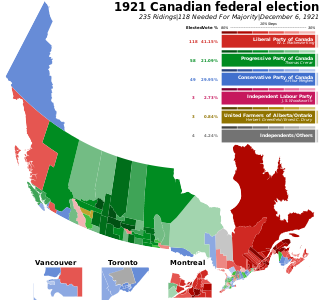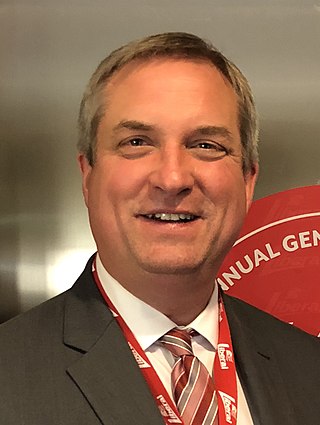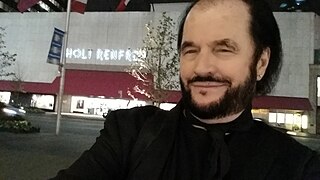
The 1993 Canadian federal election was held on October 25, 1993, to elect members to the House of Commons of the 35th Parliament of Canada. Considered to be a major political realignment, it was one of the most eventful elections in Canada's history. Two new regionalist parties emerged, finishing second and third in seat count. Most notably, the election marked the worst defeat for a governing party at the federal level and the worst ever suffered by a governing party in the Western democratic world. The Liberal Party, led by Jean Chrétien, won a majority government, defeating the governing Progressive Conservative Party in a landslide.

The 2004 Canadian federal election was held on June 28, 2004, to elect members to the House of Commons of Canada of the 38th Parliament of Canada. The Liberal government of Prime Minister Paul Martin lost its majority but was able to continue in office as a minority government after the election. This was the first election contested by the newly amalgamated Conservative Party of Canada, after it was formed by the two right-of-centre parties, the Progressive Conservative Party and the Canadian Alliance.

The 1921 Canadian federal election was held on December 6, 1921, to elect members of the House of Commons of Canada of the 14th Parliament of Canada. The Union government that had governed Canada through the First World War was defeated, and replaced by a Liberal government under the young leader William Lyon Mackenzie King. A new third party, the Progressive Party, won the second most seats in the election.

The 1988 Canadian federal election was held on November 21, 1988, to elect members to the House of Commons of Canada of the 34th Parliament of Canada. It was an election largely fought on a single issue: the Canada–United States Free Trade Agreement (CUSFTA); the Progressive Conservative Party campaigned in favour of it, whereas the Liberal Party and the New Democratic Party (NDP) campaigned against it.

The 1972 Canadian federal election was held on October 30, 1972, to elect members of the House of Commons of Canada of the 29th Parliament of Canada. It resulted in a slim victory for the governing Liberal Party led by Prime Minister Pierre Trudeau, which won 109 seats, compared to 107 seats for the opposition Progressive Conservatives led by Robert Stanfield. Trudeau's Liberals experienced a decline in support as a result of rising unemployment.
In Canadian politics, a leadership convention is held by a political party when the party needs to choose a leader due to a vacancy or a challenge to the incumbent leader.

Gerry Byrne, is a Canadian politician who was a Liberal Member of Parliament from 1996 to 2015 representing Humber—St. Barbe—Baie Verte, Newfoundland and Labrador, and a cabinet minister in the government of Jean Chrétien. Since the 2015 provincial election, he has served as MHA for Corner Brook. Byrne served in provincial cabinet during the Ball government and is currently Minister of Fisheries, Forestry, and Agriculture in the Furey government.

The 1945 Canadian federal election was held on June 11, 1945, to elect members of the House of Commons of the 20th Parliament of Canada. Prime Minister William Lyon Mackenzie King's Liberals won a third term. The party fell five seats short of a majority but was able to rule as a majority government with the support of Independent Liberal MPs.
Maurizio Bevilacqua is a Canadian politician who served as the 4th mayor of Vaughan from 2010 to 2022. He was a Liberal member of Parliament (MP) from 1988 to 2010 and was one of eleven candidates for the 2006 leadership contest, but dropped out of the race on August 14, 2006. He has been described in the media as a "right-of-centre, business friendly Liberal".

David Zimmer is a former politician in Ontario, Canada. He was the Liberal member of the Legislative Assembly of Ontario for Willowdale from 2003 to 2018. He served in the cabinet of Kathleen Wynne, succeeding Wynne herself as the Minister of Aboriginal Affairs in 2013 for the full five years and four months length of the Wynne Ministry's.
For the Texas businessman, see Hugh Roy Cullen.
Joe Spina is a former politician in Ontario, Canada. He was a member of the Legislative Assembly of Ontario from 1995 to 2003, representing a Brampton-area riding for the Progressive Conservative Party.
This is page shows results of Canadian federal elections in Midwestern Ontario, which is roughly from Woodstock to Milton, and from Lake Erie to Goderich.
The Canadian Action Party ran a number of candidates in the 2004 federal election, none of whom were elected. Information about these candidates may be found here.
The Conservative Party of Canada ran a full slate of 308 candidates in the 2006 Canadian federal election. Some of these candidates have separate biography pages; relevant information about other candidates may be found here.

In 2006, the Liberal Party of Canada held a leadership election to choose a successor to outgoing leader Paul Martin. Martin had announced that he would not lead the Liberals into another election, following his party's defeat in the 2006 federal election in Canada. The party's biennial convention, already scheduled to occur from November 29 to December 1, 2006, in Montreal's Palais des congrès, was followed by the party's leadership convention at the same venue occurring December 2 to December 3, 2006.
The Liberal Party of Canada held a leadership election on 23 June 1990 at the Olympic Saddledome in Calgary, Alberta. The party chose former Deputy Prime Minister Jean Chrétien as its new leader, replacing the outgoing leader, former Prime Minister John Turner.

The 40th Canadian Parliament was in session from November 18, 2008 to March 26, 2011. It was the last Parliament of the longest-running minority government in Canadian history up to that point, that began with the previous Parliament. The membership of its House of Commons was determined by the results of the 2008 federal election held on October 14, 2008. Its first session was then prorogued by the Governor General on December 4, 2008, at the request of Prime Minister Stephen Harper, who was facing a likely no-confidence motion and a coalition agreement between the Liberal party and the New Democratic Party with the support of the Bloc Québécois. Of the 308 MPs elected at the October 14, 2008 general election, 64 were new to Parliament and three sat in Parliaments previous to the 39th: John Duncan, Jack Harris and Roger Pomerleau.
By-elections to the 40th Canadian Parliament were held to fill vacancies in the House of Commons of Canada between the 2008 federal election and the 2011 federal election. The Conservative Party of Canada led a minority government for the entirety of the 40th Canadian Parliament, with little change from by-elections.

Micheal John O'Brien is a Canadian commercial pilot, humanitarian leader, journalist, musician, and politician, who was declared a winner on election night, November 21, 1988, and despite recounts that went back and forth, he was sworn into office as elected and made his Maiden Speech in the House of Commons of Canada on December 23, 1988.










